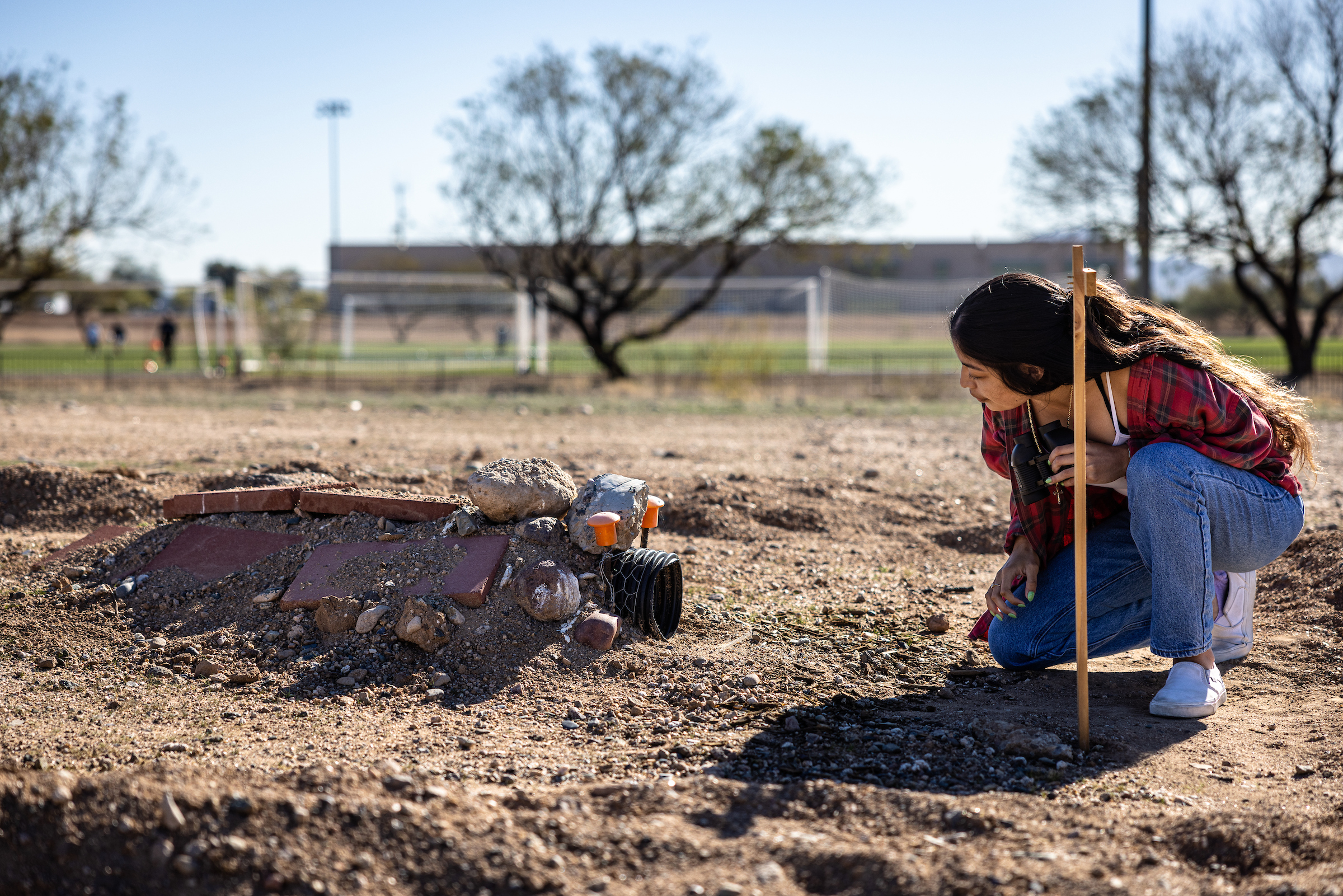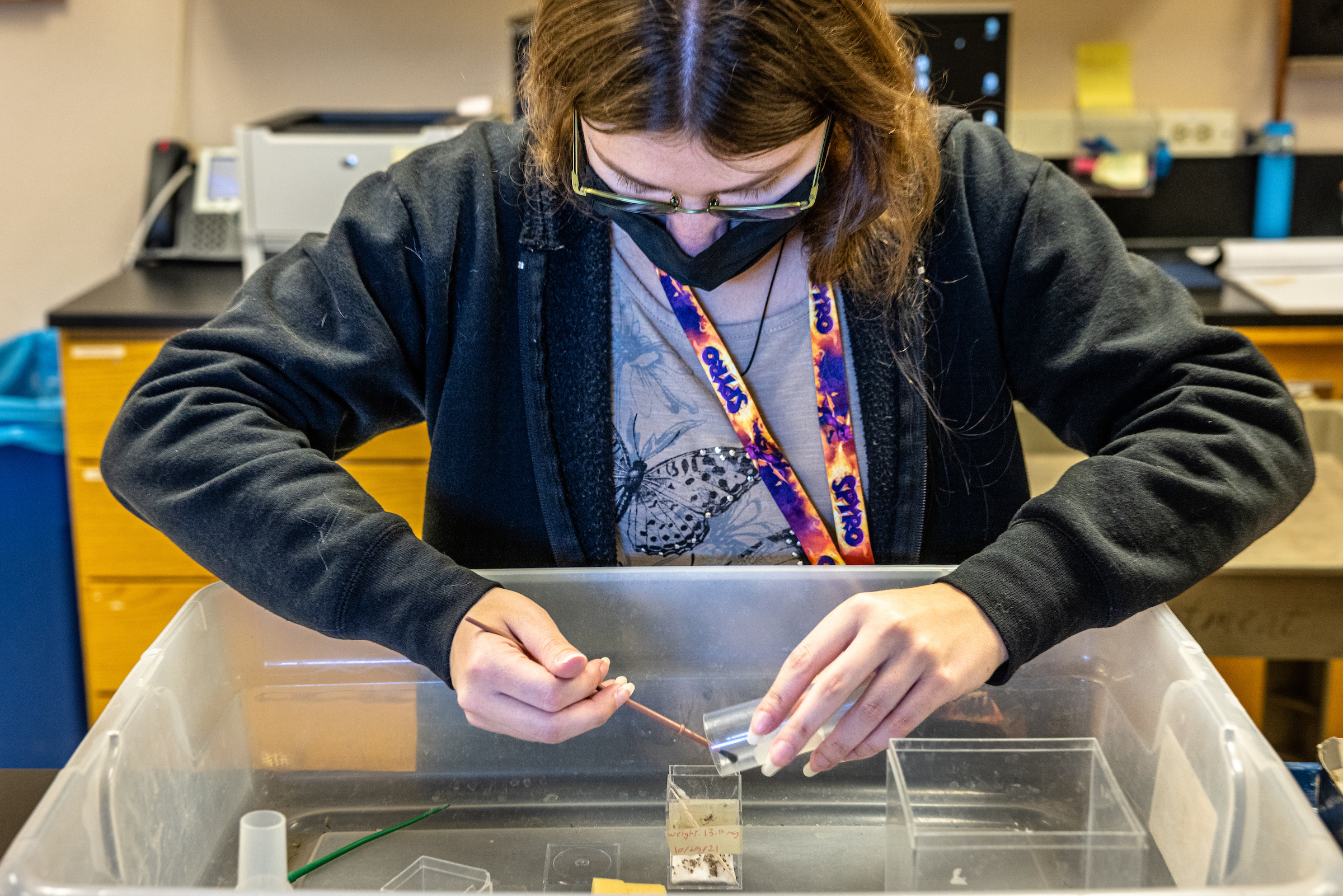NCUIRE gives undergrads opportunity to conduct research on West campus

A few years ago, Todd Sandrin, the dean of Arizona State University’s New College of Interdisciplinary Arts and Sciences, got a call from a potential employer in the Valley.
The employer was asking about a student who had applied for a job and used Sandrin as a reference. Was it true, the employer asked, that the student was working on a hope-to-be-published research project and using a $250,000 piece of equipment?
“Yeah,” Sandrin replied. “That’s what they’re doing.”
“OK,” the employer said. “I had a pile of 80 applications. That just took it to the top.”
Such is the beauty of NCUIRE — the New College Undergraduate Inquiry and Research Experience. The concept, first visualized by Sandrin when he was in school, and implemented in the New College in 2011, gives undergraduates the ability to work on research projects at the ASU West campus for either academic credits or a stipend.
MORE: Learn more about ASU's undergraduate research programs
Since 2011, approximately 450 undergraduates have been part of NCUIRE, and this semester 47 students are in the program. One of those students is Gabi Dimas, a second-semester freshman who is researching burrowing owls and how their fear of humans corresponds to their success in relocating.
First-year biology student Gabi Dimas studies the behavior of burrowing owls around one of the habitats on ASU’s West campus on Monday, March 7. Dimas wants to become a wildlife veterinarian, specializing in wildlife rescue and rehabilitation. Photo by Charlie Leight/ASU News
Dimas’ participation in NCUIRE has led to an internship this summer with the Wild at Heart wildlife rescue service in Cave Creek, Arizona, the next step toward what she hopes is a career as a wildlife veterinarian.
“That’s been a huge benefit that I’ve personally gotten from this project,” Dimas said. “I never would have connected with Wild at Heart had I not been on this NCUIRE team. It’s given me a really great head start on my career. Getting into vet school is so competitive that if you don’t have hands-on experience, you’re probably not even going to be considered.”
Dimas’ story is precisely what Sandrin had in mind when he developed an undergraduate research program as an assistant professor at the University of Wisconsin Oshkosh from 2001 to 2007. Upon arriving at ASU in September 2008, he had a conversation with Elizabeth Langland, then the vice provost of ASU's West campus and dean of the New College of Interdisciplinary Arts and Sciences. Langland pointed out that the retention rate is higher for students who have a job on campus.
“Is there something we could build?” Langland asked.
Typically, programs similar to NCUIRE are extremely competitive and accept only juniors or seniors with high GPAs. But Sandrin wanted to make NCUIRE more inclusive, one of the key components in ASU’s charter.
Why don’t we, Sandrin said, build a program that is open to all undergraduates, doesn’t include a GPA requirement and also offers financial compensation?
Those last two pieces were important to Sandrin. He believes GPA is a “really poor indicator” of a student’s ability. Not everyone at ASU initially agreed, though. Sandrin recalled getting pushback from some faculty members.
“I heard, ‘How do we know if they’re good students? How are they going to succeed?’” Sandrin said. “I would communicate to them, and myself, ‘What have they communicated to you about the why they want to do this? What have they communicated to you about the how they’re going to do this?
“And I think that was kind of how we said, let’s worry less about GPA and let’s get the narrative piece in there. But we realized later on that wasn’t even necessary. If a faculty member says this student approached me and she is wildly enthusiastic, creative and talented, that’s good enough.”
Sandrin also recognized that many of ASU’s students would prefer a stipend because they have to work to help defray the cost of college.
“I can tell them you’re going to work with West campus faculty who are building the next-generation cancer treatment or an Alzheimer’s drug, and they’re all over that,” Sandrin said. “But they’re like, ‘Dude, I work 35 hours a week and I’m a single parent. How am I going to do that?’”
Thus, students can either get academic credit for being part of NCUIRE or receive a stipend that ranges from $500 to $3,000, depending on whether they’re a research assistant, part of a team or an NCUIRE scholar or NCUIRE Fellow, both of which are a proposal-based application.
“It’s almost like being able to pay off my education with my education,” said junior Katherine Colledge, who is applying to become a NCUIRE Fellow in the fall and is working on an oral history of people who have resettled in Arizona from countries in conflict. “It cuts back the stress of having to worry about my bills. I currently work full time. So, just even being able to cut back to part time would allow me to study more, even to socialize more. Because I feel like I’m always having to make a sacrifice somewhere in my life. To get so much from this project and be able to cut back on my work, it’s just like a win-win situation.”
NCUIRE’s success is unquestionable. From 2007 through 2012, students who participated in NCUIRE had a four-year graduation rate of 81.4%, compared with 56.5% for students who weren’t part of the program. The retention rate for NCUIRE students from 2007 to 2015 was 97.8% compared with 80.1% for non-NCUIRE students.
But those numbers aren’t as important as the experience for students like Colledge and Damara Willis, who is working on a project studying why spiders are able to adapt to urban environments compared to the native desert.
For Colledge, NCUIRE has opened up doors she didn’t know existed.
“I was settled on being a teacher,” she said. “I didn’t even know that being an oral historian was a career path.”
It’s the hands-on aspect of NCUIRE that inspires Willis.
“When you’re just regurgitating information, it’s just stuff that’s provided to you,” Willis said. “You’re not actually trying to adapt what you’re learning and then putting it into a new context. We’re actually conducting our own studies. We’re learning through our own trial and error. We’re involved with the science. That’s humongous experience.”
Animal behavior biology student Damara Willis feeds two-month-old black widow spiders with some flies in the Animal Behavior Lab at ASU’s West campus. Photo by Charlie Leight/ASU News
Experience that can’t be overstated, said Laura Smalarz, an assistant professor in the School of Social and Behavioral Sciences.
“Having research experience can be make-or-break for students who are applying to graduate school,” said Smalarz, whose research program investigates the legal system from a psychological perspective and aims to prevent wrongful convictions. “Students applying to graduate school are often expected to have research experience by the time they apply, so students who haven’t worked in a research lab during their undergraduate careers often have to seek out opportunities on their own, after they graduate, which can be difficult.”
NCUIRE is available in all 45 of the New College’s undergradute degree programs. It’s fair to say that Sandrin’s vision has been in lockstep with ASU President Michael Crow’s vision: Granting access and opportunities to as many individuals as possible.
“If we had built a research program that only lets in honor students with 3.9 GPAs and above, it might be easier for the faculty,” Sandrin said. “It would certainly be easier for me to be able to brag about. But if you take it apart, you realize you didn’t do anything, really. They were on that trajectory already.
“But this is different. We’ve baked it into the DNA of the institution.”
Top photo: Animal behavior biology student Damara Willis studies a recently opened black widow egg sack in the Animal Behavior Lab. She is one of the researchers responsible for maintaining the health of the arachnids – feeding adults and spiderlings, releasing the hundreds of eggs from the egg sack, and observing their activities. Willis is taking part in the New College Undergraduate Inquiry and Research Experience, or NCUIRE program. Her goal is to work with animals, observing their behavior, perhaps in zoos or sanctuaries, or doing field research. Photo by Charlie Leight/ASU News

